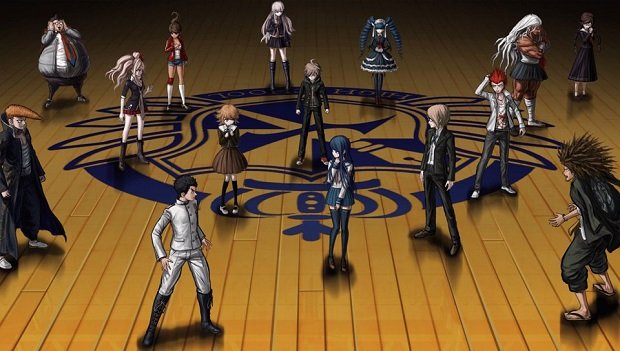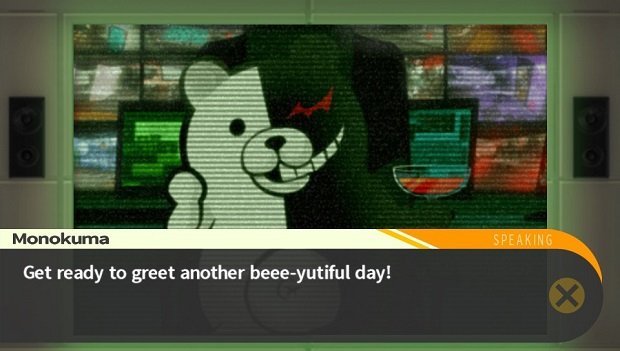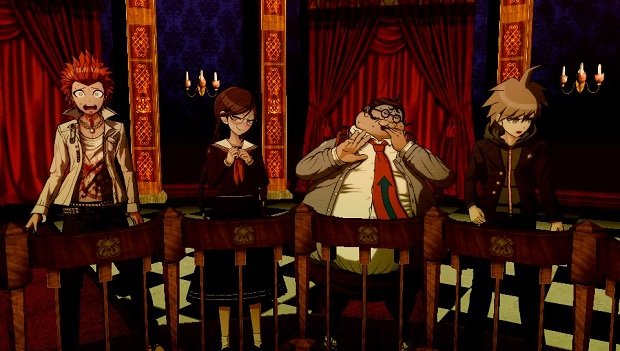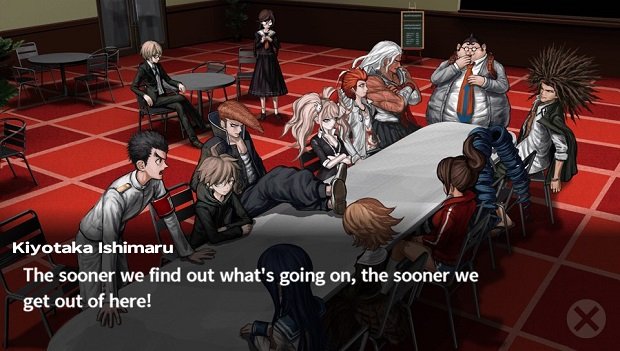If you haven't played Danganronpa yet, you need to
September 1st marks the release of Metal Gear Solid's swansong, as well as the big-budget, open-world explode-athon Mad Max. But it's also the day that the latest entry in the cult-favorite Danganronpa series finally makes its way to the West. "What's a 'Danganronpa'," you're probably thinking to yourself, "and why should I care?" I was once right there with you, totally unaware that underneath this niche, anime-inspired game was an exciting, unconventional story with surprises at every turn. But let me regale you with the story of my enlightening experience playing Danganronpa: Trigger Happy Havoc for the first time.

I'm sitting in my bed, clutching my Vita under the covers like a kid with a flashlight. My fiancée is sleeping soundly next to me. It's already two hours past the point where I should be asleep, and I've already been playing since dinnertime. But I can't stop. Someone's been murdered, and I'm in the middle of an hours-long battle of wits with 13 other suspects. If I don't figure out who did it, everyone but the murderer will be killed as well.
So I'm hammering away at the X button, reading every single line of dialogue with rapt attention. I'm playing an assortment of bizarre mini-games that attempt to simulate the logical connection between two abstract thoughts. After piecing together the puzzle, I finally peg the murderer for his crime. And a pit suddenly bottoms out in my stomach, like someone furtively stuffed about 20 pounds of assorted gravel into my gut without my knowledge.
Sure, I've saved everyone who didn't kill our friend, but I single-handedly sentenced the person who did to death. Someone who I've gotten to know pretty well over the last few hours. Someone who had just as much a reason to kill as anyone else in the room. And it's a grisly death, too, like a depraved Looney Tunes reel that remains locked up in a vault somewhere, never to be spoken of again. My classmates and I may be innocent, but our hands aren't clean.

That's Danganronpa in a nutshell, a twisted tale that's equal parts Battle Royale/The Hunger Games and Phoenix Wright: Ace Attorney, and one that will get right under your skin if you let it. But there's a good chance you haven't played it yet, and honestly, no one would blame you if you hadn't.
For one, it's a Japanese visual novel, with a title that sounds like some kind of Willy Wonka confection to our English-speaking ears. Each game is filled with reams of dialogue, and you can go for hours without making any interaction beyond tapping the X button to advance a conversation. It's also a Vita game; the final nail in a coffin practically dooming it to niche status right from the start. But none of that matters, because Danganronpa: Trigger Happy Havoc and its sequel are two of the best reasons to own Sony's "legacy" handheld.
Danganronpa follows the adventures of a group of high school students as they live out their days in Hope's Peak Academy, each one of them representing the pinnacle of some field or activity - you've got the Ultimate Programmer, the Ultimate Swimmer, the Ultimate Writing Prodigy, and so on. But this isn't a normal school: the entire academy is on lockdown, each of its windows and doors the outside world barred shut, and the headmaster is a maniacal teddy bear named Monokuma. Monokuma suggests playing a game: the only way to escape is to kill a fellow classmate and get away with it. If the killer succeeds, they get to leave the school alive, while everyone else pays for their failure with death. If the killer fails, they get the (possibly literal) axe. As you can imagine, things quickly devolve into a kind of Lord of the Flies scenario, as the kids do their best to acclimate to their new living arrangements despite the looming threat of death that hangs over them.
Weekly digests, tales from the communities you love, and more

Inevitably, someone always winds up getting killed, and this is when Danganronpa's story goes from good to great, as it transforms into a full-on interactive detective novel. As Makoto, an ordinary teen who won a spot at the academy in a raffle, your job is to investigate crime scenes, interview suspects, and piece together bits of the puzzle, which you'll then take into the class trial (each clue representing a 'truth bullet' in the chamber of your figurative pistol of knowledge). These debates are where the game's events go completely off the rails, where revelations are made and everything you think you know about the characters (and the narrative as a whole) gets flipped upside down. You think Metal Gear Solid is filled with unbelievable plot twists? Wait until you get into Danganronpa's final act - the mind-blowing revelations don't stop until you hit the game's credits.
Danganronpa's greatest strength is how it takes anime conventions and uses them against you. If you're not a fan of modern Japanese animation, it's easy to write off Danganronpa as one of those "anime games" (as I almost did). There's the awkward nice guy player character, the asshole rich kid, the demure nerdy girl, and so on. Each one fulfills the familiar archetypes you can see from a mile away, and of course there's plenty of cartoony sweat drops and fanservice to go around. But every time you think you've got the characters pegged, Danganronpa throws you a curveball, as classmates you expect to be your greatest allies turn out to be hiding secrets or ulterior motives you never would've guessed in a million years. Its parade of tropes becomes mere putty in the writers' hands, as they sculpt each stereotype only to deconstruct them, usually by smashing them to pieces. While many of the game's puzzles can be painfully obvious to solve, the final deductions made from solving them are always unexpected, and are ultimately more satisfying as a result.

If Danganronpa plays with your expectations of anime-inspired games, then its sequel, Danganronpa 2: Goodbye Despair, plays with your expectations of Danganronpa itself. Featuring a similar scenario, but trading the dour, decrepit school building for the sunny shores of a deserted island, Danganronpa 2 uses that similarity to upset your sense of comfort. Things feel familiar - a little too familiar, perhaps - and because of it, there's a sense of dread and foreboding that you can't quite shake off. The very premise of Danganronpa and how it reveals itself makes writing a sequel featuring yet another group of high schoolers trying to murder each other seem safe and pedestrian, and yet Danganronpa 2 packs even bigger and more impactful twists than the first game.
It's hard to talk about this series without wading into spoiler territory, but believe me when I say the surprises are as numerous as they are staggering, and they're absolutely worth experiencing for yourself. I wouldn't blame you if you shrugged them off at first glance, especially if you're not too deeply invested in Japanese media like anime or visual novels. But to ignore Danganronpa is to forego a fantastic story, one filled with despair and hope and pop culture references and a game inside a game and so much more. It's a murder mystery that makes you feel smart when you figure out its puzzles, but then rips away that feeling of accomplishment when you realize that you've just signed someone else's death warrant. It's darkly funny, absurdly violent, and has not one, but two of the most ridiculously memorable villains in all of video games.
Buy a Vita. Borrow a friend's. Find (God help you) a PS TV. Do whatever you can to play these games, because I guarantee you'll end up just like me: tapping away through the wee hours of the morning while a cackling stuffed animal gets inside your head in the best possible way. You've never played anything quite like Danganronpa, and that needs to change.



